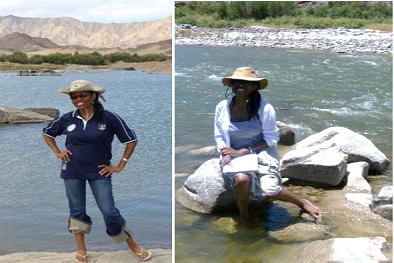However, I was recruited by and worked with open-minded males. While in the Hydrology Division, we had to carry out a lot of field work, sometimes under harsh environment. I should be happy to say that I was not directly challenged for being a woman at work, but more from the outside people. Working with farmers and other stakeholders, sometimes as a young professional, they don’t take women seriously. We will go through their farms to collect river flow and rainfall data and they would talk to your male technical assistant or driver than to you as the leader and hydrologist in the team.
I can sum it up by saying that, when I started working, although it looked tough, there were not many women hydrologists, scientists and engineers in Namibia mainly because those were not seen as careers for women. A few of us have broken the mold and entered the sector which is believed to be and is still male dominated and revered.
· Question 2: What have you done to overcome these obstacles/challenges?
Namibia just got independent when I started working. I entered a sector which did not have many women but I was determined to succeed. My interview was very strange given some of the questions I was asked, had nothing to do with the job I was being interviewed for. However, my main aim was to do my best to contribute to the new government. As a young child, I was taught to do everything I can for my nation, study hard, work hard and that was where my strength was, no matter what or who. The people I worked with at a time did not let me know whether they trusted in the ability or not. They gave the same courtesy given the fact that Namibia just came out of a difficult era or struggle for independence and was developing a young nation. The few women hydrologists and scientists I found in the Division ensure that we work together, through mentoring each other. As new women came in the Division, they got mentored and they took over the tasks of mentoring new ones. We would encourage each other to work hard in the field, collect data, write papers and present at conferences, diligently. The important thing to remember was that we all have qualifications and can do the work equally, men or women. My colleagues and I have endured many obstacles as hydrologists without complaints. We walked the rivers, played hide and seek with hippos and crocodiles in small boats, mainly for the love of what we do, to contribute towards water resources management in our country. We work hard and achieved a lot. I did not doubt myself at any time in my career or give up if I heard stereotypical comments. I had been exposed to the work in other countries and women professionals, many of whom I still envy. At conferences and seminars, I had listened to other women (and men) talking about their work with passion, especially from SADC Region and that had given me even more courage to advance to management position in the Department. I worked hard to get to where I am today and help the young recruit as they enter the sector. They deserve the opportunity just like anyone.
· Recommendations to other women in similar situations (in the water world)
Women should be allowed to do what they want to do, be what they want to be, hydrologists, engineers and scientists. The youth should not be given a message that they can’t do something because they are women. In most cases it is the individuals who have issues with women and not their ability. It is the entitlement of some men that women should not be doing what men are supposedly meant to do. As a manager, I have a lot of women in my Directorate. These are dedicated, hardworking and committed women. They can do the tasks they are given with ease.
My recommendation to other women would be to not be discouraged to pursue the career they want because of fear of ridicule. Follow your heart and passion. I am glad for the opportunity I have had so far, I manage the Directorate, I am representing Namibia at international water avenues, and I am contributing to national water policies. After more than 20 years in the water sector; this is my only job and I continue to love it and do it, no matter the challenges. I don’t concentrate on the challenges, I look forward to tackling them and coming up with viable solutions. The water sector is unpredictable. With climate variability and change, we must come up with sound advice; manage water in view of the next generation to enjoy the same.
It is important to instill in the girl or boy child the notion of hard work from the beginning in an equal manner. To believe that they can all do whatever they set their mind to and to remember to have love and passion for the water sector. No water no life, after all!
